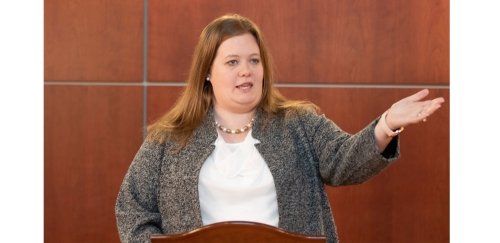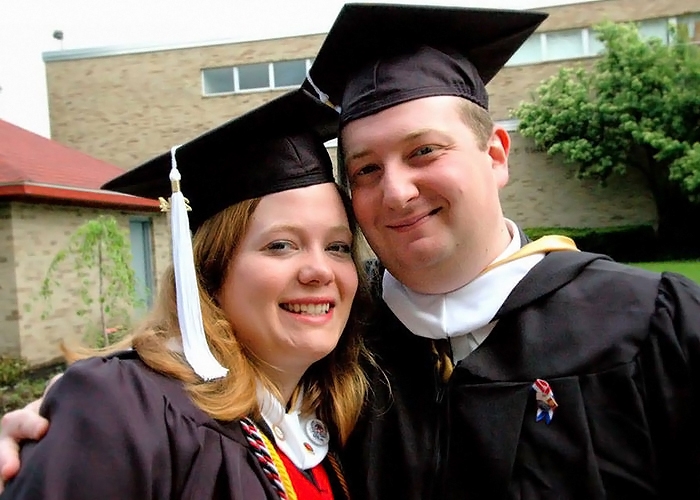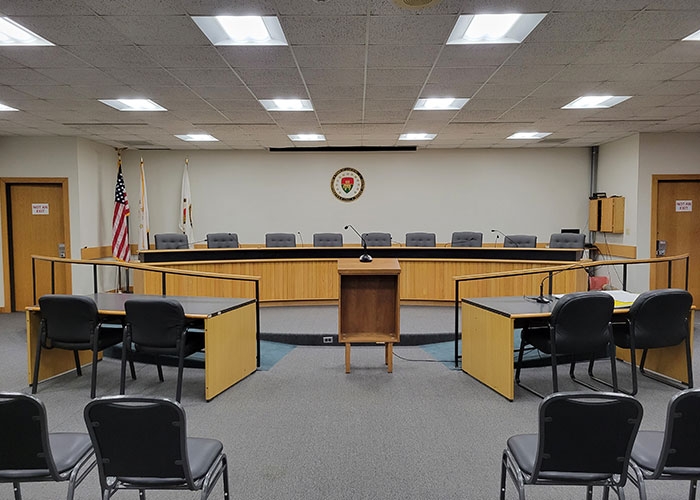From President of Student Gov’t to Councilwoman: A Q&A with Alumna Hillary Lima
- News & Events
- News
- From President of Student Gov’t to Councilwoman: A Q&A with Alumna Hillary Lima

“I can never completely leave politics. Once it’s in your blood, it stays there.”
These are the words of Hillary (Costa) Lima ’14 during an interview she gave 10 years ago as president of Student Parliament. Today she is councilwoman for the Town of Coventry.
“If you look at the past leaders of Student Community Government , many of us are still working today to better our communities and to better Rhode Island,” she says.

But nine years ago Lima was just getting her feet wet in politics. She was 20 years old and a senior political science and communication double major, who had risen up the ranks from speaker, to vice president, to president of Student Parliament.
In her junior year, Lima interned at the State House as Senate page and got a further taste of the inner workings of government: “I was asked to answer phones in the secretary’s office for then-Senate President Teresa Paiva-Weed. The door was cracked and she was meeting with majority leaders from both sides and you could hear them yelling at each other. Student Parliament is a microcosm of the real world.”
She sat down for an interview with RIC News in 2013. This is an excerpt from that interview:
“I got involved in Student Parliament because one of the members asked me to run after the speaker resigned,” Lima said. “As speaker, my job was to run the meetings and maintain decorum. The speaker recognizes people for the floor, goes through the entire agenda and tells people to be quiet if they’re breaking the rules.”
“I came to be known for my strict speaker style and for keeping everybody in line,” she said. “I made sure everybody had a fair shot and I always advocated for those who were afraid to speak up, even if everybody thought they were wrong. People really appreciated that. By the end of the year, I was well liked enough that I was elected vice president.”
“As vice president, there were so many times I wanted to resign. I definitely didn’t want to run for president,” she said. “Like the White House, there’s a lot of infighting. Instead of focusing on working for their constituents, people are trying to block the agenda of those they don’t like. But there were people who told me, ‘You’re the one who’s fit to do this.’ So, I ran, and now I’m so glad I did because I brought student government back to what it was supposed to be.”
Looking back on that 2013 interview, what do you see in the younger Hillary?
Back then I made a lot of things very high stakes. I’ve learned not to take things too personally and to distinguish between what’s business and politics and what’s not. It was also the first time in my life that I had fundamental disagreements with people. You don’t have disagreements like that in high school. I think it should probably happen sooner in our lives.
Are political disagreements today louder than they were back then?
I don’t know if they’re louder so much as people are shutting each other down more. They’re not willing to listen. We’re losing the art of being able to hear information and change our minds based on that information.
Where did your interest in politics start?
Neither of my parents ran for office but we’d always have the evening news on at dinnertime. The TV would be propped on the kitchen counter, and we’d have conversations, as a family, about current events. My mom was a leader. She was on the executive board of the PTA, and then she got a job with the school department. Whenever there were school committee meetings, I’d go with her. She’d show me the agenda and help me follow along, and afterwards, I’d ask questions. I’d also go with her to town financial referendum meetings, where you could propose amendments to the budget.
Politics may be an ancestral thing, too. My ancestors on my mother’s side were politicians. My great, great, great, great grandfather is Nehemiah Rice Knight, [ninth] governor of the State of Rhode Island [from 1817-1821]. Knightsville, a neighborhood in Cranston, was named after him. And his father was a U.S. representative from Rhode Island.
You once said, “People get involved [in politics] because they have a sense of hope that things can be better. They almost feel like it’s up to them to fix things.” Is that why you ran for town council in Coventry in 2021?
I’ve always wanted to run for council but it was never the right time. I wasn’t making a ton of money and I didn’t have the relationship capital to start a political career. But in December of 2020, the person who held the District 4 council seat resigned, so, I gave it a shot.
Right now I’m finishing the previous councilor’s four-year term, and I have to decide if I’ll run for reelection. It’s hard not to. The thought of being on the sidelines and watching someone else do what I feel I have it in me to do on behalf of my constituents stays in the back of my mind.

What does a council member do?
We propose the budget for the town; however, the voters have to approve or reject the budget. We’re also fiduciarily responsible for how the budget is spent. And we’re on call all the time. On a day-to-day basis, I’m responding to emails from people about issues that affect them, whether there’s been a storm and their street hasn’t been plowed, or they have potholes that they want filled, or there’s a flickering streetlight in their neighborhood, or there’s flooding in their backyard from poor drainage from a new development.
How did RIC prepare you for this job?
The real-world experience I had at RIC was huge, whether it was having my own political talk show [“Capitol Hill] on RIC’s radio station or writing for the Anchor newspaper or working in student government. As president of student government, I learned how to conduct myself in meetings with the college administration, and I learned from members of Parliament how to listen to opinions different from my own.
I have nothing but good memories about being on student government. I run into former students I worked with in Parliament at RIC events and we’ve embraced and caught up. Many of us have stayed in Rhode Island and lead within the community. Travis Escobar co-founded Millennial Rhode Island, a professional networking nonprofit, and he’s on the Providence School Board. Kyla Pecchia is a lawyer now, working for the Office of the Attorney General. Jordan Day is policy director for the Rhode Island League of Cities and Towns. And our most famous student government member is Congressman James Langevin. If you look at the past leaders, we’re all working today to better our communities and to better Rhode Island.
This interview was edited and condensed.
